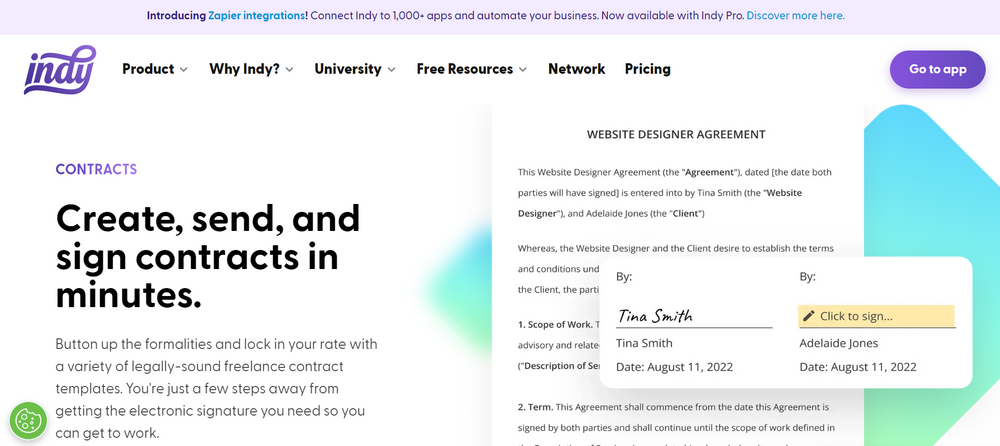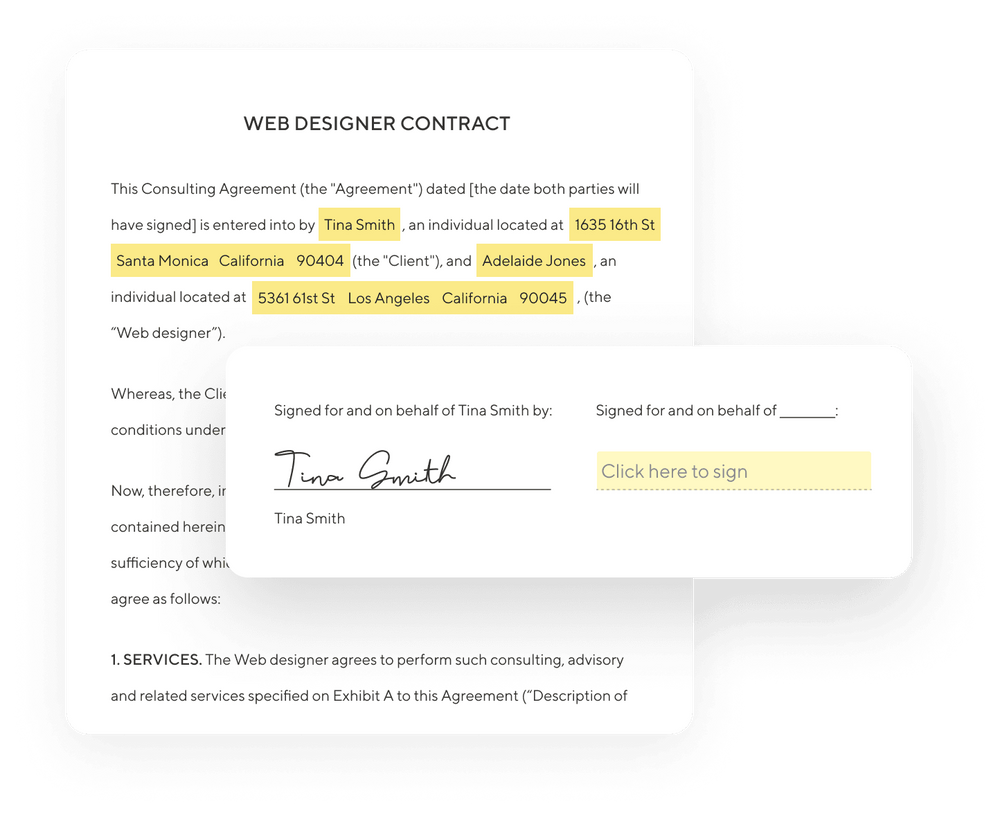Most freelancers will eventually come across a contract that requires them to work under the constraints of a nondisclosure agreement (or NDA). The terms of an NDA are typically defined within a contract under a confidentiality clause. This is why it's essential to understand it before you agree to one!
In this article, we will explain what a confidentiality clause is and what it regulates, and explain why it's so important to use it if you're a freelancer. So, let's get started!
What is a confidentiality clause?
The goal of a confidentiality clause is to prevent the other party from disclosing confidential information. For example, an NDA or confidentiality agreement is designed to protect personally identifiable information (or PII), sensitive data, or trade secrets.
Traditionally, NDAs were quite balanced. One party wanted to keep certain information private, and the other agreed to do so. However, some NDAs have enabled bad actors to coerce others or avoid consequences. This is why it’s essential to understand what NDAs are and what they should include—as well as the risks of being too narrow or too broad when defining what confidential information means for a project.
The definition of confidential information
The goal of confidentiality agreements or clauses is to ensure certain information receives confidential treatment. But what's exactly being protected? In most cases, this type of written agreement includes disclosing regulations for:
- Personally identifiable information (or PII): Information that can identify an individual. For example, full names, social security numbers, financial information, or medical records, to name a few.
- Sensitive personal data: A specific set of categories that need to be given more security. For instance, information about racial or ethnic origin, trade union memberships, political opinions, or biometric data.
- Trade secrets: Data that is commercially valuable, is known only by a limited group of people, or has been given special treatment to remain secret.
Other types of confidential information people typically include in NDAs and confidentiality clauses include:
- Customer lists and supply sources.
- New business development opportunities.
- Marketing data and models.
- Know-how information, usually protected under trade act sections.
- Property rights and information that is protected by industry standards.

Why is a nondisclosure agreement or confidentiality clause important?
As we mentioned, the goal of a nondisclosure agreement or confidentiality agreement is to protect certain information and define how the business will be conducted. This is done by getting the two parties to agree (and obtaining a party's prior written consent before sharing certain data).
Although these agreements are standard across a variety of industries, NDAs and confidentiality clauses are very common with freelancers. The main reason is that people working under this modality tend to handle many clients at once (and are typically not under a permanent employment contract). All clients want to make sure their confidential information is protected and will not be shared with others!
So, what are the main benefits and downsides of NDAs?
For freelancers, showing that you're willing to sign such a document can give your client confidence that you intend to keep their projects confidential. However, you usually won't be able to include the project as part of your resume or portfolio (most freelancers agree to limited sharing; for example, by being allowed to talk about what they did as a case study).
For clients, NDAs and confidentiality clauses are a legitimate way to protect private information and feel more at ease when working with others—plus, they can help build trust. However, NDAs can be tough to enforce and expensive to prosecute if there is a breach.
What is regulated by confidentiality clauses?
When you create or sign an NDA or a contract containing such a clause, you agree not just to not disclose confidential information; you also learn what data is not subject to the agreement and the applicable law. In many cases, another common component is a definition of what happens if one party should violate the confidentiality agreement. For instance, any penalties that can be imposed.
It's essential to reach a good definition of what's to be regulated and all prior or subsequent rights that are part of a confidentiality agreement. After all, if the definition is too narrow, it won't cover some infringements—but if it's too broad, it might penalize the recipient party unnecessarily.
The structure of an NDA or confidentiality clause
There are a few elements that are shared between all NDAs or confidentiality clauses. Firstly, there is always a definition of what confidential information is in the specific context of the written agreement. We've covered some common examples above, such as PII, sensitive data, and trade secrets, but there can be others depending on the company and project.
Because of the nature of these contracts and clauses, this part tends to be a little vague. After all, listing your trade secrets here would defeat the purpose! Instead, most people choose to use terms such as "innovative processes," "customer information," or "sales figures" as protected data.

An NDA or confidentiality clause will also always include what each party's confidentiality obligations are. For freelancers, this will typically include things such as:
- If you are a freelancer working with other parties or subcontractors, you agree to make them sign an equivalent NDA.
- With a one-way NDA, you agree to keep the other party's information confidential, while a mutual NDA ensures both parties agree not to share specific data.
- Upon written request, you can be ordered to destroy or return certain confidential information.
- You might not be able to show any work resulting from the project; for instance, if you're a graphic designer, you could be asked not to share any screenshots or examples in your portfolio.
Another important consideration for a confidentiality clause is exclusions. Some information you share won't be considered confidential, so it's important to define this, as well.
Lastly, most NDAs typically include a time frame. It's uncommon for information to be protected forever. Instead, most data will be so for a number of months or years, after which the product is usually released. Following up on the example above, as a freelancer, you might be able to showcase the project in your portfolio after some time has passed.
Pro Tip: If you're asked to sign a contract or NDA that does not include a termination date, you are entitled to request a reasonable time limit be added to the written document.
Enforcing a confidentiality clause or NDA
Although an NDA defines what would constitute a breach, just like it happens with any contract, enforcing it can be both costly and complicated—no matter how comprehensive your clause is. This is why prevention is better than cure!
As a rule of thumb, if you're the one about to send confidential information to someone else (a client, a colleague, or someone you are hiring), it's always a good idea to limit the information you will be sharing. Breaches can happen, so it's best to limit the data and always clearly mark it as confidential. Lastly, always include which country's or state's law will apply to your NDA or contract—especially if you're working with people from a different place from you.
Designing your own NDAs and confidentiality clauses
If you're writing your own NDA or confidentiality clause for your freelance contract, make sure you always include:
- The contract's objective (for example, to complete a certain project).
- The definition of what is considered confidential information.
- All activities that are permitted or prohibited.
- Any penalties for violating the agreement.
- A time frame for the contract to be valid. Remember, you can't keep the information confidential forever!
Wrapping up
An NDA or confidentiality clause offers several benefits to both freelancers and clients. For one, they are great for building trust and feeling confident about sharing important information that can lead to successful project completion. Signing this type of contract, however, should not be taken lightly. Bottom line: If you're a freelancer, you should always read NDAs carefully and be clear about what you want or would not do.

If you want an easy way to manage all your freelance business needs, including creating and signing contracts, tracking billable hours, and receiving payments, you should check Indy. Indy is a one-stop solution that includes nine tools to help you save time and money. You can join for free and see what the platform can do for your business.



